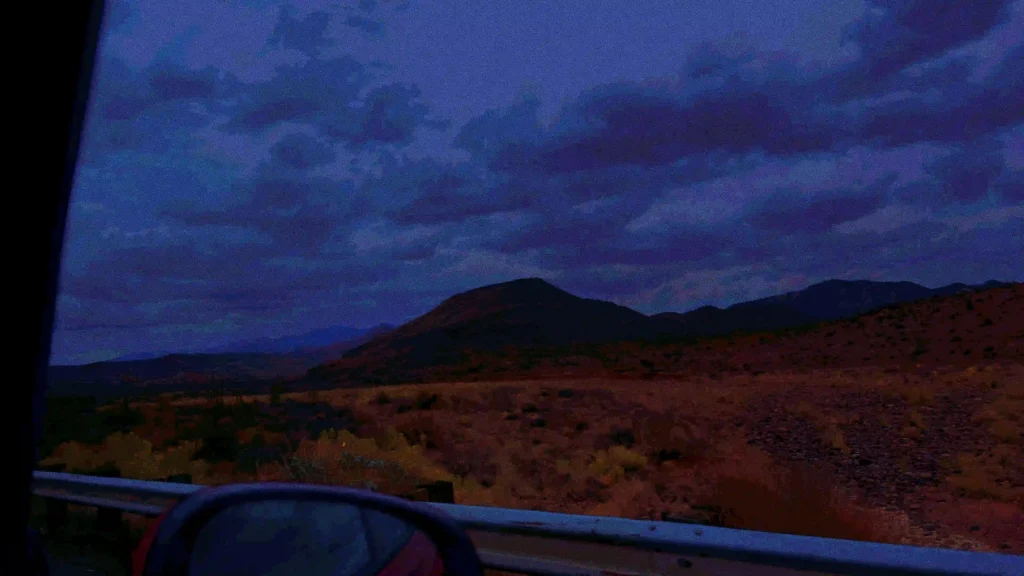Every year, sometime in January, when the Ohio winters are so cold that it burns the skin, Frank and Betty set out to Fountain Hills, Arizona, a cheap retirement community north of Phoenix. Frank packs the car and drives. Betty picks a novel and reads the entire trip. They spend the entire winter there. Frank plays keno at the casino. Betty putters around the condo and cooks and cleans. When they sense the warmer weather has returned–usually around April–they start their journey back to Ohio.
Frank and Betty are snowbirds. Snowbirds is a term that describes those who travel to warmer climes to escape the harsh winters of the Midwest. Most snowbirds are Midwesterners–kind, smiling, well-fed, salt-of-the-earth types.
This particular year was the thirty-third time they had made the trip, and it had just begun. The fields of Indiana stretched off into the horizon out of the car window–a similar landscape to Ohio.
Frank drove, and Betty read aloud from Magic Mountain, by Thomas Mann. She had chosen this voluminous work because she thought it was a murder mystery similar to stories by Sir Arthur Conan Doyle or Agatha Christie. It had been sitting on her shelf for years.
Betty liked exciting stories with deliciously evil characters who enacted clever and pernicious plots. As she read it to Frank, she realized that this was the worst kind of novel–literary. Betty despised pretension, and literature was the most affected. Nonetheless, once started, Betty believed one had to finish a book, so she read on. Besides, she only brought one book.
“You’re doing well with all the German names,” Frank said, somewhere outside Illinois.
“You’re doing a great job driving,” Betty replied. She put the book down and squeezed Frank’s thigh. She caressed his knee with her thumb while closing her eyes to rest them.
The tires blurted on the warning grooves–a quick staccato–and Frank corrected the car. Betty opened her eyes to see Frank, slightly embarrassed, smiling.
“We’re all right,” he said. “I’ve righted the ship.”
Betty returned to reading aloud.
“This guy sure likes to talk,” Frank said. “When is he going to do something?”
“I think the point is that each person he talks to represents a different philosophy,” Betty says. They’re a little over halfway through the book.
“I think I get that,” Frank said. “I thought that Naphta person was making some good points, but I have to disagree that suffering makes life worth living.”
“He was the worst,” Betty said. “Who can think that suicide is a political act? It’s so selfish.”
In Oklahoma, the landscape changed dramatically. Betty always found this part of the trip to take the longest. They seemed to be endlessly driving up and down low rising hills of grasslands. There wasn’t much to look at. They were a little over two-thirds of the way done with the book.
“Would you ever lock me in a sanitorium, dear?” Frank asked.
“Of course not,” Betty said, taking a drink of her water. A bit dribbled down her chin.
“What if I went crazy?” he said.
“We’re all a little crazy,” Betty said.
“I think it’s crazy that this guy visits the sanatorium to see his cousin, and then he just stays there,” Frank said.
“He got sick,” Betty replied.
“Or are they making him sick?” Frank said.
Betty knew Frank had had enough of this book, but she thought it was important to keep on reading.
Leaving Oklahoma and entering Texas brought about less greenery and more browns. They didn’t have long now, and Betty was worried that they wouldn’t finish the book. She took a break from reading and looked at Frank.
He hunched over the wheel. His seat was forward so that his knees stuck up. He had retained his hair over the years, but it was thin and gray. His shoulders, which were once broad and powerful, now looked thin and bony. Betty hadn’t noticed his aging.
That’s the way of it, she thought. You get old in bits and pieces.
“Aren’t you going to continue?” Frank said. “I can’t wait to find out what happens to Hans Castorp.”
“We can listen to the radio. Or talk about something?” Betty said.
“That’s all right,” Frank said. “I want to see how this guy dies.”
“Dies? How do you know he’s going to die?” Betty said.
“We all die,” Frank said. “But this guy is definitely going to get it.”
The desert began in New Mexico. Frank had a coughing fit and almost drove the car off the road.
“I swallowed wrong,” he said.
When they crossed the state line into Arizona, Betty had almost finished the book. She felt proud, but she was tired.
As the sun set, Frank said, “I think we should push through. I don’t want to stop.”
“Will it bother you if I have the light on?” Betty said.
“Not at all,” Frank said.
Betty read on through the night. She read that Hans Castorp, the protagonist of the book, decided, after several years, to join the military and finally leave the sanatorium. She flipped the last pages of the book and read the scenes of war–finally some excitement–and how Hans Castorp sings amidst the battle.
She read the last line, “And out of this worldwide festival of death, this ugly rutting fever that inflames the rainy evening sky all round–will love someday rise up out of this, too?”
Frank was hunched over with both hands on the steering wheel. The headlights illuminated the stretches of asphalt in the dark desert. They couldn’t see the cactus or the mountains or the palo verdes on either side of the highway. They missed the pack of javelinas rutting in the valley off the highway. They couldn’t see the flocks of cranes or sparrows or robins or warblers seeking warmer weather.
Frank gripped the wheel and drove.
“We’re almost there.”


Leave a Reply
Log in or Join the Crew to leave a comment.